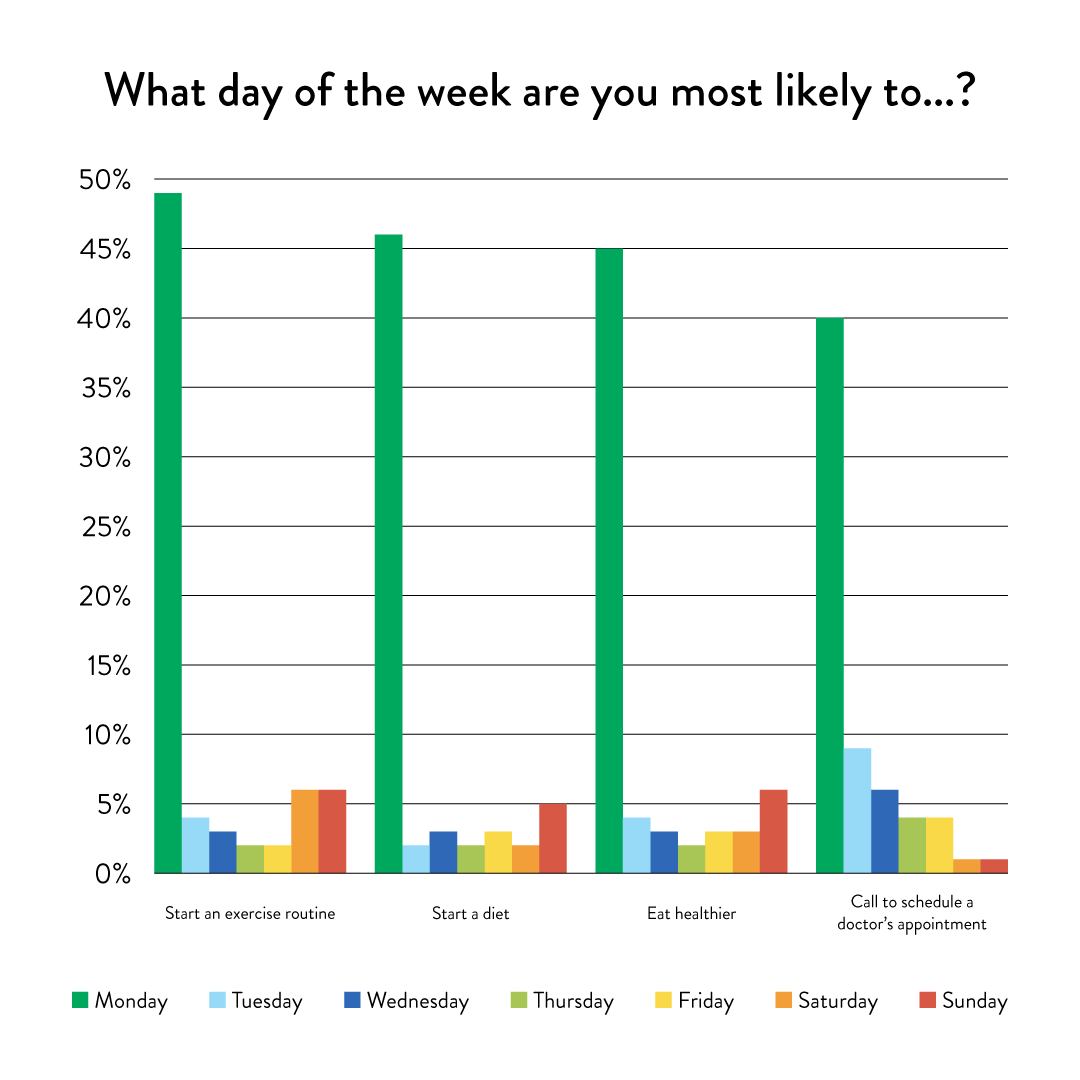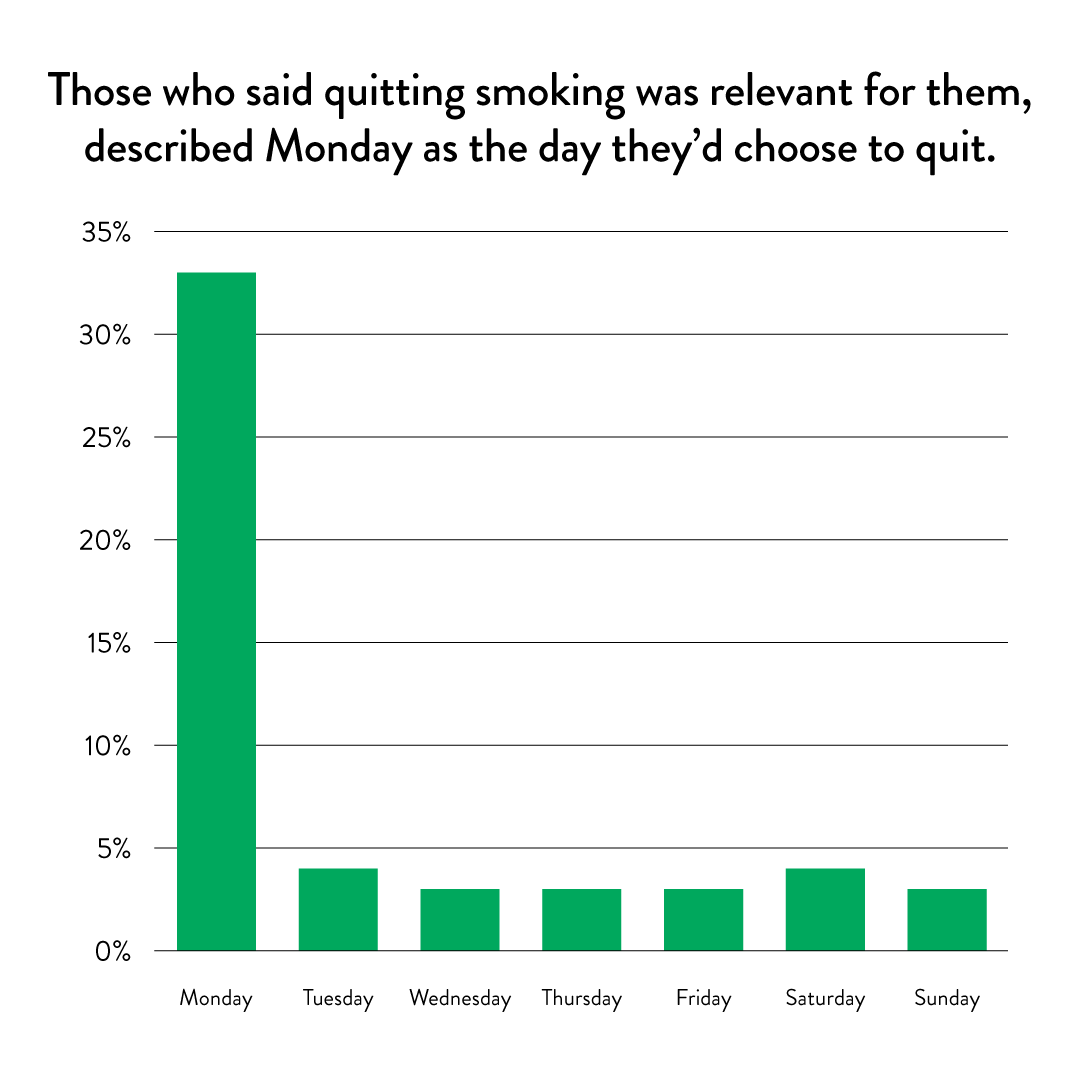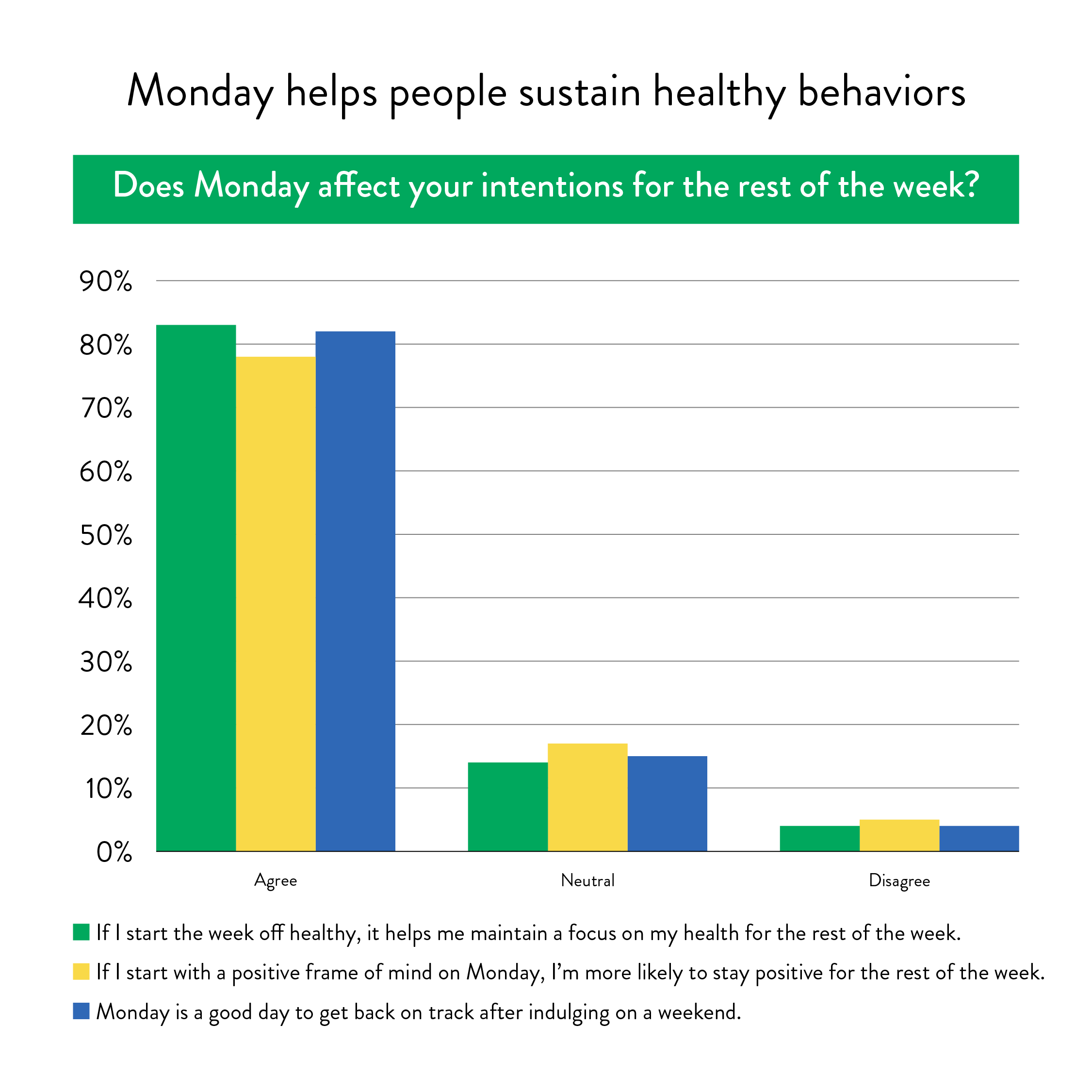The Research Behind Monday
The key to health behavior change is to create healthy habits that can be sustained over time. A growing body of evidence suggests that healthy thinking and behavior is synchronized to the week, with Monday being the day people are most “open to buy” health. Using this “Monday effect” can be a powerful leverage point in public health promotions to help people stay on track with their health goals.
Staying at Home: How Well Did Americans Maintain Their Health Behaviors?
The Monday Campaigns conducted a short survey with Researchscape International in 2020 to better understand how people were able to maintain their healthy behaviors and health goals during the pandemic. View the findings here.
Monday has a special significance in our culture as the beginning of the week, which influences our mood and health outcomes
The 7-day week and the meaning we associate with the days of the week is a social construct, and not based on biological or planetary cycles. Yet a range of negative health outcomes, such as heart attacks and strokes, happen more frequently on Mondays as people transition back to the structured routine of the week.1
A 2021 nationwide survey conducted by the Data Decisions Group for The Monday Campaigns tracked awareness and behavior related to Mondays and healthy behaviors. While 11% of people report that Monday is “a day to dread”, many people see Monday positively. They view it as an opportunity for a “fresh start” (40%) and a day to “get my act together” (18%).
83% of responders to the survey agreed that starting the week off healthy would help maintain a focus on health for the rest of the week. 82% of the survey panel agreed that Monday is a good day to get back on track after indulging on the weekend.2
There’s a surge in healthy contemplations and actions on Monday.
People are more likely to either start diets, exercise regimens, quit smoking or schedule doctor’s appointments on Monday than on other days of the week.3,4


People call tobacco quit lines more on Mondays than other days.5, 6
An analysis of health-related Google searches from 2004-2012 showed a consistent pattern of spikes at the beginning of the week. This pattern was also seen in tobacco-related searches in 6 different languages.7, 8, 9


Engaging in healthy behaviors on Monday helps people sustain healthy behavior throughout the week.
Dieters can have greater long term success if they use Monday as a “refresh” day to get back on track. One study showed that it was normal to gain some weight over the weekend, but the individuals that got back on track with their weight loss regimens at the beginning of the week were most likely to either lose or maintain weight over time.10
People report that starting the week off with exercise, healthy eating, good stress management, and a positive attitude keeps them on track throughout the week.11


Taking small steps that build over time can help people sustain healthy behavior
Periodic, frequent messages have the potential to improve a range of health behaviors.12
Monday cues can help people maintain their resolutions.13
Survey respondents said that inability to stay on track, dealing with the COVID pandemic, lack of discipline and not seeing results quickly enough were the main challenges in maintaining a New Year’s resolution.
The main actions that would help survey responders keep their New Year’s resolution(s) are to take some time on Sunday to prepare for the week (53%), do something simple to start off each week (47%), and set up weekly reminders (42%).
Most agree that a Monday refresh could help. 86% of individuals who made a resolution in 2021 believe that recommitting to their New Year’s resolution every Monday would help them maintain their resolution or resolutions.
The Monday Campaigns: The Evidence Supporting Healthy Behavior
[1] Fry, J. & Neff, R. Johns Hopkins School of Public Health Center for a Livable Future. (2010). Healthy Monday: Two literature reviews. Baltimore, MD.
[2] Data Decisions Group, 2019. 1,000 online survey respondents.
[3] Unpublished data gathered from NY-based gyms and the Johns Hopkins recreation center.
[4] Data Decisions Group, 2021. 1,010 online survey respondents.
[5] Erbas, B., Bui, Q., Huggins, R., Harper, T., & White, V. (2006). Investigating the relation between placement of Quit antismoking advertisements and number of calls to Quitline: A semiparametric modelling approach. J Epidemiol Community Health, 60, 180-182.
[6] Johnson, M.J. (2011). Weekly patterns in usage of tobacco quit lines. Presented at the 2011 North American Quitline Consortium.
[7] Ayers, J.W., Althouse, B.M., Johnson, M.J., Cohen, J.E. (2014). What’s the Healthiest Day? Circaseptan (weekly) Rhythms in Healthy Considerations. American Journal of Preventive Medicine, 47, 73-76.
[8] Ayers, J.W., Althouse, B.M., Johnson, M.J., Cohen J.E. (2014). Circaseptan (Weekly) Rhythms in Smoking Cessation Considerations. JAMA Intern Med, 174, 146-148.
[9] Dai, H., Milkman, K.L., & Riis, J. (2013). The fresh start effect: Temporal landmarks motivate aspirational behavior. Management Science, 60, 1-20.
[10] Orsama, A., Mattila, E., Ermes, M., van Gils, M., Wansink, B., & Korhonen, I. (2014). Weight rhythms: Weight increases during weekends and decreases during weekdays. Obesity Facts, 7, 36-47
[11] Data Decisions Group, 2019 and 2021. 1,000+ online survey respondents.
[12] Fry, J. & Neff, R. Johns Hopkins School of Public Health Center for a Livable Future. (2010). Healthy Monday: Two literature reviews. Baltimore, MD.
[13] Data Decisions Group, 2021. 1,010 online survey respondents.